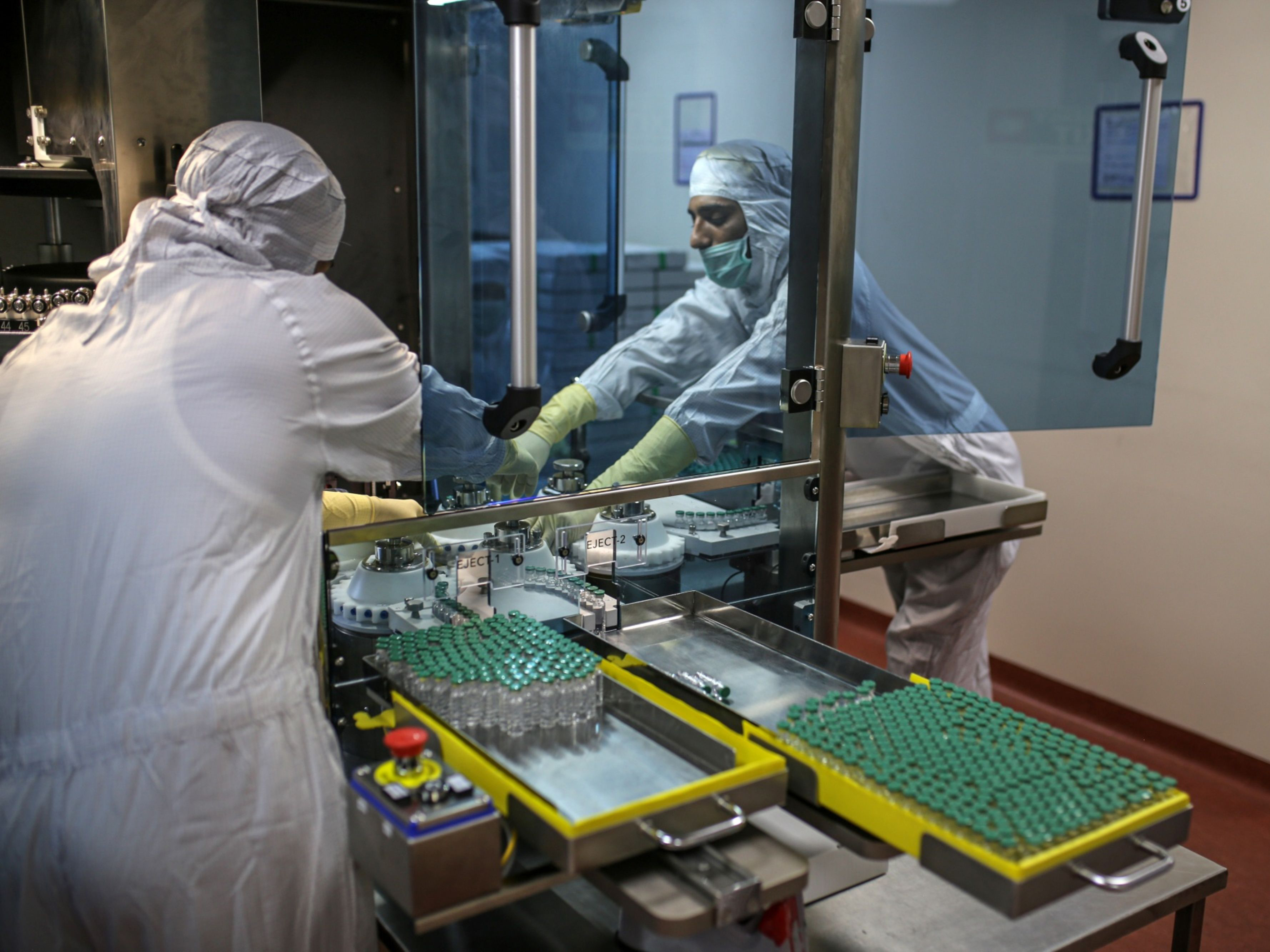
Home » AstraZeneca Vaccine Faces More Supply Hurdles, Now From Thailand
AstraZeneca Vaccine Faces More Supply Hurdles, Now From Thailand

June 21, 2021
AstraZeneca Plc’s COVID-19 vaccine manufacturing partner in Southeast Asia has missed a delivery target in Thailand and shipments to other countries in the region have been delayed, the latest setback for a shot that was meant to be the backbone of the global inoculation effort.
Thailand was slated to receive and administer 6 million AstraZeneca vaccine doses in June but health authorities last week said they would be distributing only about 3.5 million of those shots this month. Pledging to still give out 6 million doses as planned, officials appear to be making up the shortfall with millions of shots from China’s Sinovac Biotech Ltd.
Shipments of shots made by Siam Bioscience — AstraZeneca’s Bangkok-based partner, which has links to the Thai royal family — to Malaysia and the Philippines have also been delayed, though both countries say they don’t expect to be waiting for too long.
The situation comes on top of delivery problems at India’s Serum Institute of India Ltd., another AstraZeneca partner, which has left developing countries from Nepal to Rwanda short of shots that were promised through the World Health Organization-backed Covax program. Siam Bioscience is AstraZeneca’s sole Covid vaccine partner in Southeast Asia, a region that is trailing on inoculation and where the virus continues to flare, including in Thailand where infections have surged over the past two months.
AstraZeneca declined to comment, while Siam BioScience didn’t respond to requests for comment.
The Philippines now expects a batch of nearly 1.2 million AstraZeneca shots to be shipped from Thailand in mid-July rather than this month, though a government official said the initial delay will not derail the country’s vaccination push. In Malaysia, authorities say they’re working to resolve the issues around the delivery schedule, which the government stated in May would see 610,000 doses arrive from Thailand in June and another 410,000 in July.
AstraZeneca itself is also facing legal action from the European Union for a production shortfall, with the company only delivering 30 million doses to the bloc in the first quarter, compared with an original target of 120 million.
Seeking Alternatives
The Anglo-Swedish company, which partnered with the University of Oxford on the vaccine, received orders to supply as many as 3 billion doses worldwide before efficacy data came out last year, more than twice as many as any other first wave shot, data compiled by Bloomberg shows.
While not exclusive to AstraZeneca, the various delays — particularly out of India, which has banned the export of Covid vaccines — have left dozens of countries that were counting on the shot desperate to find doses elsewhere, and undermined the company’s bid to supply the developing world.
Now, countries are turning to alternatives, particularly shots developed by Chinese companies Sinovac and Sinopharm that recently received approval from the WHO. While they’re less effective than the Messenger RNA vaccines made by Pfizer Inc., BioNTech SE and Moderna Inc., these shots are easier to store and transport.
Thailand, which aims to vaccinate 70% of its population by the end of this year, is also now allowing regional health authorities to extend the interval between Astrazeneca vaccine doses to 16 weeks, from 10 to 12 weeks previously, though officials say the move is to optimize the shot’s effectiveness and not for lack of supply.
The country has also ordered 20 million doses of the Pfizer-BioNTech vaccine and is in talks for 5 million doses of the single-shot Johnson & Johnson vaccine as it continues to expect deliveries of the Astra shots from Siam Bioscience.
New to Vaccine-Making
AstraZeneca’s vaccine is among the cheapest of the first round of Covid shots because the company said it wouldn’t take a profit, selling it at cost.
But the lack of economic incentives could have constrained AstraZeneca and its manufacturing partners’ ability to get the supply chain in order, said Carlos Cordon, a professor of strategy and supply chain management at the Institute for Management Development in Lausanne, Switzerland.
“The supply chain of the Astra vaccine is not an easy one and, logically, one would assume that there will be more than one source of supply to avoid bottlenecks,” Cordon said. “A little bit of an economic incentive would have certainly helped to make companies in the supply chain even eager to make higher production volumes.”
AstraZeneca’s choice of Thai partner raised questions from the start. Unlike India’s Serum — which was the world’s biggest vaccine maker before the pandemic — and other Asia partners like South Korea’s SK Bioscience Co., Siam Bioscience is new to the vaccine-making business.
The company was founded in 2009 as Thailand’s first domestic bio-pharmaceutical drugmaker by the father of the nation’s current King Maha Vajiralongkorn, to provide cheaper alternatives to imported drugs. It has also made Covid test kits.
It’s set up by the Crown Property Bureau, an agency that managed assets for the palace no matter who sat on the throne. The company had been operating at a loss in the four years leading up to the year of pandemic, when it brought in a net profit of 35.8 million baht ($1.1 million), according to data published by the Department of Business Development.
In February, Thai Prime Minister Prayuth Chan-Ocha said Siam Bioscience does not seek to profit from making the Astra vaccines.
Royal Links
Complicating matters is Thailand’s lese majeste law, which can see jail time of up to 15 years for defaming the royal family. Its sweeping mandate means that little is said publicly about Siam Bioscience, even as concerns over vaccine supplies grow.
In January, Thai officials said that Siam Bioscience would make 200 million doses each year. They haven’t spoken publicly again about the company in detail since.
When former prime-ministerial candidate Thanathorn Juangroongruangkit suggested that Siam Bioscience’s royal ties played a role in its appointment as AstraZeneca’s partner, the high-profile government critic was charged with royal defamation.
Prime Minister Prayuth apologized to the public for the delay, blaming “supply and distribution issues” without elaborating. Neither the Thai government nor Siam Bioscience responded to repeated requests for information on what is causing the supply shortfalls.
One Thai healthcare industry veteran, who asked not to be identified for fear of legal repercussions, likened the situation with Siam Bioscience to a bakery that just started making bread.
“They still haven’t perfected their craft,” he said. “None of us really knows their production capacity because they haven’t publicized it and we can’t criticize it. No one is willing to say. They can’t say it, because it’s Siam Bioscience.”
While noting that he has no insight into the relationship between AstraZeneca and Siam Bioscience, Nikolai Petrovsky, a professor at the College of Medicine and Public Health at Flinders University in South Australia, said it could be an example of how politics have factored in the choice of manufacturers for vaccines. Governments in some countries “picked their best friends rather” than the best vaccine makers when awarding contracts, he said.
While some western countries like the U.S. are starting to reopen amid consistent supplies of vaccines, many parts of Asia are lagging behind, particularly developing economies, raising the risk of resurgent outbreaks that could seed new virus strains.
Due to regulatory setbacks and the export ban — imposed as India suffered a devastating second wave — the Serum Institute has only delivered 30 million of the minimum 200 million doses of the AstraZeneca shot promised to Covax, an initiative designed to ensure equitable vaccine access between rich and poor nations.
“These supply issues do highlight the need for additional regional vaccine manufacturing capability in the Asia Pacific region,” Petrovsky said. “Hopefully, governments will see the sense in investing in this increased capability even once the immediate threat of this pandemic has subsided.”
RELATED CONTENT
RELATED VIDEOS
Related Directories
Subscribe to our Daily Newsletter!
Timely, incisive articles delivered directly to your inbox.
Popular Stories
-

-

Diversifying Production From China: Welcome to ‘The Great Reallocation’
-

U.S. Fleet Professionals Look Toward Sustainability to Cut Down on Rising Operating Costs
-

Next-Generation Packaging Brings Reliability and Visibility to Supply Chains
-

In the Transition to Electric Vehicles, Components Sourcing Will Be a Growing Challenge

2024 Supply Chain Management Resource Guide: There's Only One Way Off a Burning Platform
VIEW THE LATEST ISSUECase Studies
-
Recycled Tagging Fasteners: Small Changes Make a Big Impact
-

Enhancing High-Value Electronics Shipment Security with Tive's Real-Time Tracking
-

Moving Robots Site-to-Site
-
JLL Finds Perfect Warehouse Location, Leading to $15M Grant for Startup
-
Robots Speed Fulfillment to Help Apparel Company Scale for Growth